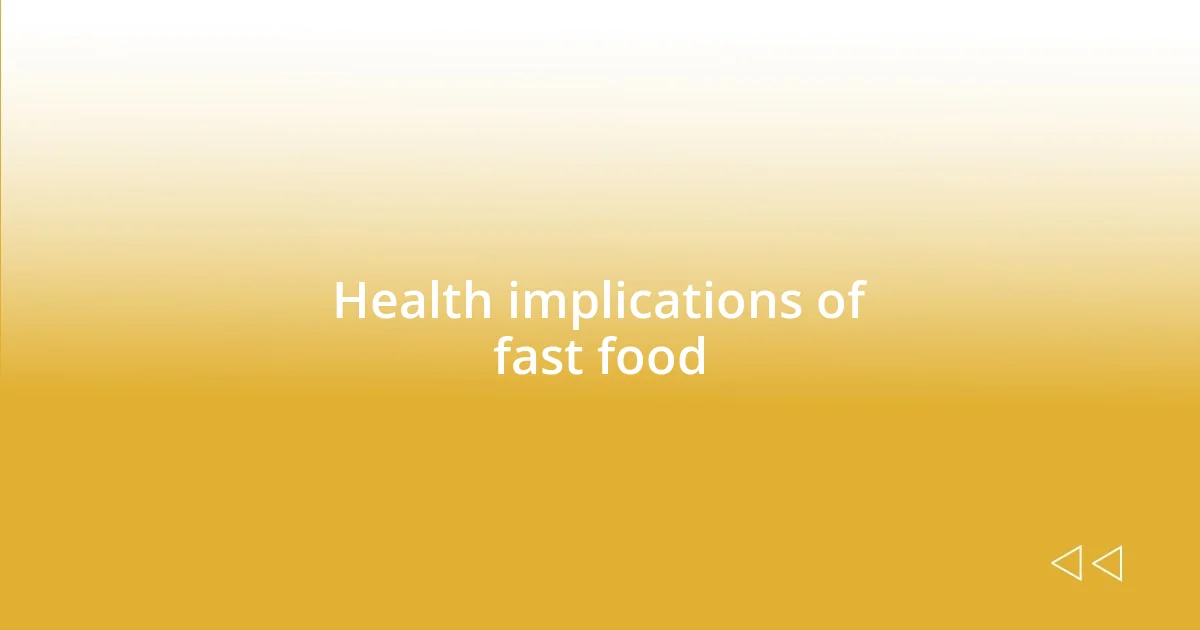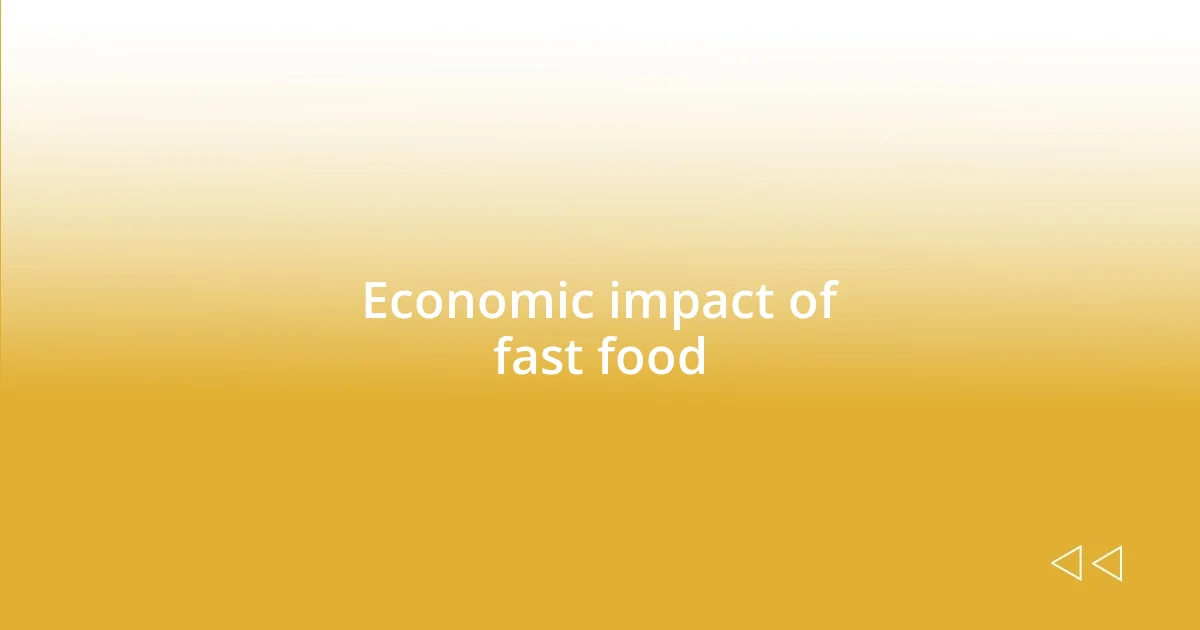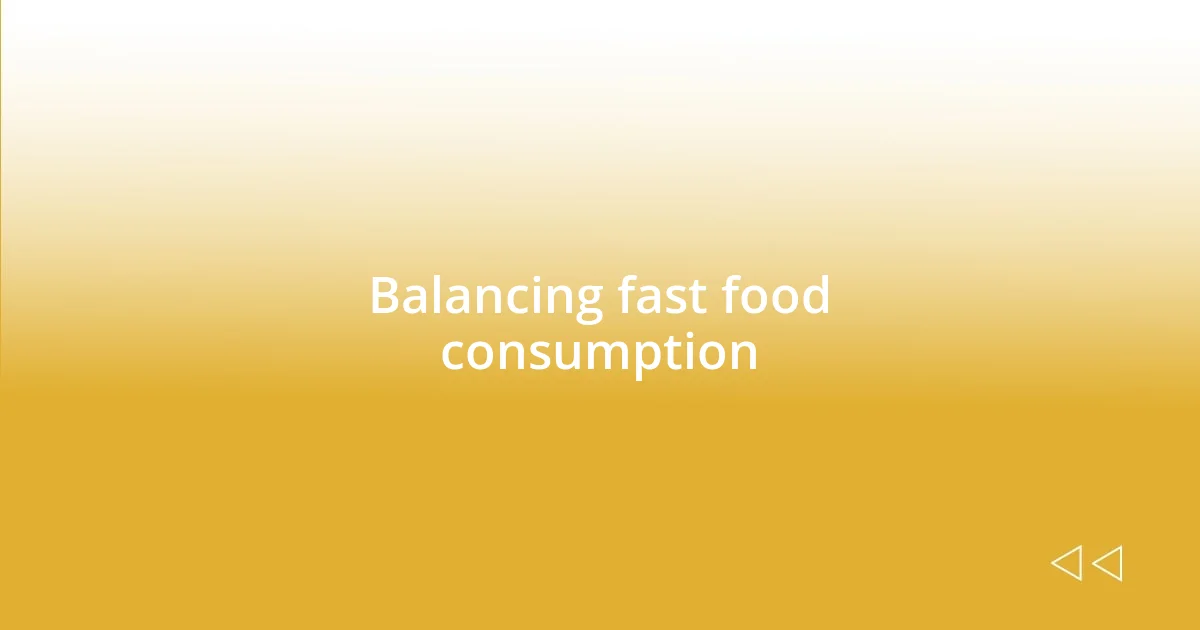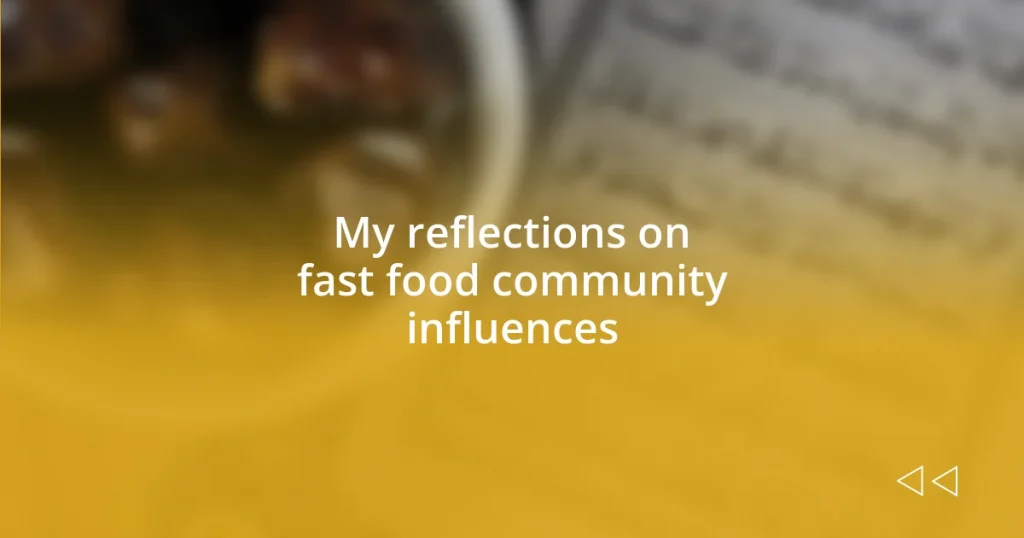Key takeaways:
- Fast food influences social interactions and emotional connections, serving both as a comfort food and a means of bonding with others.
- Health implications of frequent fast food consumption include risks of obesity, high blood pressure, and heart disease, highlighting the need for moderation.
- Strategies for healthier choices at fast-food restaurants include customizing orders, planning ahead, and practicing portion control to balance indulgence with nutrition.

Understanding fast food influence
Fast food has a remarkable pull on our lives, doesn’t it? I remember a time when I was swamped with schoolwork and the local burger joint felt like a lifesaver—not just for the meal but as a brief escape from stress. It’s fascinating how a quick bite can trigger memories and emotions linked to comfort and convenience.
When I think about how fast food shapes our social interactions, I can’t help but recall countless evenings spent with friends at drive-thrus, laughter echoing as we shared fries. It’s more than just food; it creates an atmosphere of connection. Have you ever noticed how these outings foster camaraderie, as we bond over our favorite indulgences? The influence is deeper than I initially thought.
What strikes me, though, is the way fast food advertisements play on our desires and perceptions. Have you seen how they promise happiness with every meal? It makes you wonder—are we chasing a fleeting thrill rather than true satisfaction? Reflecting on my own experiences, it’s clear that while the convenience is undeniable, the emotional response we associate with these meals cultivates a complex relationship that’s hard to untangle.

The appeal of convenience food
The charm of convenience food lies in its ability to save time and effort. I recall a busy weekday when I had back-to-back meetings and just a quick pit stop at a fast-food drive-thru saved me from going hungry. It’s a small choice that can make a huge difference in our hectic lives, right? With everything moving so fast, I often find myself gravitating towards meals that require minimal commitment.
What really draws people in, including myself, is the immediate gratification that quick-service options provide. I remember a late-night craving for tacos after a long day, and a simple phone call to a nearby taco place brought me the comfort I needed within minutes. It’s almost like a warm hug in a wrapper! This instant fulfillment not only curbs hunger but also serves up a slice of happiness that we sometimes overlook.
Moreover, the variety offered in convenience food is quite impressive. We can choose from burgers, salads, or even ethnic options, all at our fingertips. I love being able to indulge in sushi rolls one day and pizza the next, depending on my mood. It’s as if our culinary cravings can be met without any fuss. In this fast-paced world, the appeal of having so many options just a drive away is certainly hard to resist.
| Aspect | Convenience Food |
|---|---|
| Speed | Ready in minutes |
| Emotional Connection | Feels like a comfort food escape |
| Variety | Wide range of choices |

Health implications of fast food
The health implications of fast food are a significant concern that I can personally relate to. I vividly recall a time when I indulged in a daily fast food habit during a particularly stressful work month. While I savored every bite, I soon noticed the toll it took on my body—lack of energy and unexpected weight gain were hard truths. Fast food often comes loaded with unhealthy fats, sugars, and sodium, which can lead to a range of health issues over time.
Here are some key health implications associated with frequent fast food consumption:
- Increased risk of obesity due to high-calorie meals.
- Elevated blood pressure linked to excessive sodium intake.
- Higher likelihood of developing heart disease from unhealthy fats.
- Possible digestive issues resulting from processed ingredients.
- Potential for insulin resistance, leading to type 2 diabetes.
Reflecting on my choices, I understand the allure of fast food, but I’ve learned the hard way that moderation and balance are essential. Each visit may feel like a moment of indulgence, but it’s crucial to consider how those choices affect my overall health in the long run.

Fast food’s role in lifestyle
Fast food isn’t just about grabbing a meal; it often shapes our social interactions and lifestyle choices. I still remember the excitement of meeting friends at our favorite burger joint after a busy week. It wasn’t just about the food; it became a tradition that strengthened our bonds, creating memories over shared fries and milkshakes. Isn’t it interesting how a simple fast-food outing can play a role in forming connections with others?
In my experience, fast food also reflects a sense of immediacy in our culture. For instance, during a late-night study session, a pizza delivery became my lifeline. It energized me when I was on the edge of exhaustion, allowing me to push through those last-minute assignments. This dependency on convenient food during critical moments raises questions: Are we sacrificing quality for the sake of speed? I’ve often wondered how this quick-fix mentality influences our overall approach to nutrition.
When we think about fast food in our lifestyles, it can be a double-edged sword. I’ve recognized how often I lean on fast food during hectic weeks, but this sometimes leads to a cycle of convenience over health. There’s a part of me that craves the nostalgia of home-cooked meals yet finds solace in the ease of a quick drive-thru stop. It’s a tug-of-war between convenience and mindful eating, something I constantly navigate in my daily life.

Economic impact of fast food
The economic impact of fast food is quite extensive, affecting everything from local job markets to global supply chains. For example, I remember the buzz in my town when a new fast-food franchise opened up—it wasn’t just about burgers and fries. The restaurant created dozens of jobs, providing employment for many young people in the area. Isn’t it fascinating how a single establishment can breathe new life into a community?
Moreover, fast food companies often rely on large-scale agriculture for their ingredients, which has both economic and environmental implications. I’ve seen firsthand how, in some regions, the demand for cheaper produce drives farmers to adopt practices that might not be sustainable for the long term. These choices can affect local economies, as we might be trading short-term profits for long-lasting consequences. What does this mean for our food future?
Fast food also influences consumer spending patterns. I often find myself contemplating how often I could choose a quick fast-food meal over preparing a home-cooked dish. With prices that sometimes rival a sit-down meal, fast food is appealing for its perceived value. However, I have to ask myself—what are we really supporting with our dollars? Each purchase reflects our priorities, shaping the market in ways that extend beyond just a meal.

Strategies for healthier choices
Choosing healthier options at fast-food restaurants doesn’t have to be a daunting task. One effective strategy I’ve employed is customizing my orders. For instance, I often swap fries for a side salad or choose grilled chicken instead of fried. This way, I still indulge in the fast-food experience without overloading on calories and fat. Have you ever tried modifying your order? It can be surprisingly simple yet impactful.
Another approach I find helpful is planning ahead. I typically check the menu online before I go, allowing me to identify healthier choices beforehand. By doing this, I avoid the overwhelming temptation of impulse buying when I get there. It’s amazing how a little foresight can alter the entire dining experience, don’t you think? I’ve found that being mindful about my choices helps me feel more satisfied, both physically and mentally.
Lastly, I’ve learned the importance of portion control. Sometimes, I order a small meal instead of a large one, which often satisfies my cravings without making me feel sluggish afterward. I’ve noticed that by listening to my body and recognizing when I’m full, I can enjoy my meal without regret. It’s all about balance and moderation. Have you ever considered how controlling portions can play a pivotal role in enjoying fast food healthily? It’s a lesson I embrace every time I treat myself.

Balancing fast food consumption
Balancing fast food consumption is really about making intentional choices. I’ve found that setting limits can transform my approach to eating out. For example, when I decide to treat myself to fast food, I commit to doing it only once a week. This small change helps me appreciate those meals more and ensures that I’m not overwhelmed by unhealthy options.
I also try to mix in healthier foods during the week. When I do enjoy a fast-food meal, I complement it with a nourishing salad or some homemade vegetable sticks at home. This not only nourishes my body but also balances out those indulgent cravings. Don’t you think it’s empowering to take control of our meals rather than letting them control us?
Another thing I’ve noticed is the impact of sharing meals. I often go to fast-food places with friends, and instead of getting separate large meals, we share a couple of orders. This way, we get to taste a variety of flavors without overindulging. Plus, sharing adds a social aspect that makes the experience more enjoyable—who doesn’t love a good meal with friends? Balancing fast food isn’t just about calories; it’s about savoring every moment and every bite.















